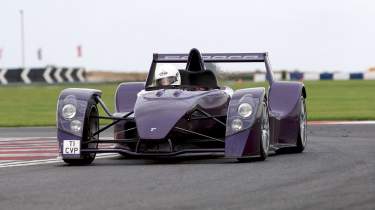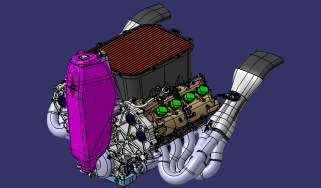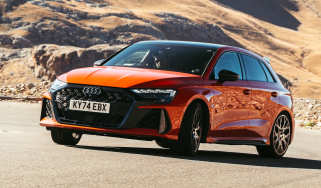Caparo T1: Purple Daze
In this world exclusive, we're first to drive the 610bhp Caparo T1 on the road – and put some figures to its mind-blowing performance
I really don’t like Clarkson sometimes. There I was, returned to the Catchpole family home for the weekend, and whilst mother Catchpole was concocting something hearty on the stove, the curly haired Vectra lover popped up on the screen in the corner of the room with the Caparo T1 in all its 610bhp, 600kg glory. I’m sure you’ve seen the skit: he has half of Surrey and Hampshire’s emergency services on hand and then proceeds to say that it is undriveable at both low and high speeds and will kill all the Premiership footballers who buy it.
My parents fairly quickly caught on that this was the self same car that I was meant to be driving the following week and, whilst I’m not sure she would bemoan the loss of the odd Rooney or Terry, this was not the sort of jaunt that a mother wants to hear is in store for one of her offspring. It took quite a lot of persuading to convince her that it was merely Clarkson being a ham-fisted numpty and that I’d be fine. I didn’t bother to tell her about Jason Plato. Or the Dutch journalist and the case of the broken wishbone at the original launch event that we attended last year (evo 107).
A few days later the insurance disclaimer pinged into my inbox. Stipulating a helmet seemed fair enough, but full flameproof overalls, boots and gloves? It didn’t actually mention brown underwear, but…
Then, just two days beforehand, carefully laid plans started changing. Originally I was going to be the first journalist (and probably the second person ever) allowed to drive the T1 on the road, getting my chance to take the wheel while the car underwent testing in Wales. But then there were some cold feet; Caparo wasn’t completely happy with how the car might ride on the road. Instead they’d decided that I could only ride in it as a passenger. This didn’t exactly lift my heart and fill me with joy, because whilst I’d psyched myself up for controlling my own 922bhp-per-ton destiny, the idea of simply sitting there whilst someone else grappled with the car seemed rather unpleasant.
It’s with this thought tumbling around in my mind that I wake up to a particularly miserable-looking Wales on a Thursday morning. The soggy sheep I pass on the way to the chosen test road look about as morose as me, but then I am in a KTM X-Bow, looking out through droplets streaking over my visor. When I arrive the weather hasn’t improved and we find ourselves in the middle of a moist cloud that’s fogging-up the hillside. Everyone agrees that there is nothing to be done in the way of photography or driving, so I jump into Phil Bennett’s Clio 197 and we go off in search of sun.
Phil has worked for evo in the past, but he is better known for his Touring Car and Sports Car exploits and setting a lap record round the Nürburgring in a turbocharged Radical SR2. He’s very fast and knows absolutely no fear. For the last year, though, he has been working with Caparo on the T1 and it’s enlightening chatting to him about it as he left-foot-brakes his way across the misty moors.
‘They shouldn’t have let it out so early,’ he says of the early press exposure, ‘but they rather sweetly thought the world’s press would understand it was a prototype and cut it some slack. We’ve spent the time since then sorting things out, durability testing and honing the ride and handling. It is now a car that you can simply get in and drive without having to worry about it. That’s what makes it more attractive than buying a second-hand F1 car.’
I ask Phil about the Top Gear piece.
‘Well, I drove it around the track and it didn’t understeer in the way that Clarkson said it did,’ he says. It seems the trouble was that he of the ’80s stonewashed jeans would boot the car in a straight line, be flabbergasted by how quick it was, then realise that there was a corner coming up rather rapidly, so he’d hit the brakes, wipe off too much speed and then try to accelerate the whole way through the corner. And of course if you do that then it’s going to understeer – as would any other car.
The fact that Clarkson said it was unsafe was what really rankled Caparo, though, because one of the principal innovations that designer Ben Scott-Geddes is proud of is the safety aspect of the carbon tub – the same technology that protects F1 drivers so spectacularly. So why all the protective gear, you might ask, and what about the Jason Plato incident? Phil reiterates that the cars were still in development when the world’s media started driving them, that Caparo was flattered by the attention, so it naïvely let them drive the prototypes. And though the car is now effectively finished, we’re still gatecrashing a test session. I doubt any supercar goes through its development without crashing or breaking, it’s just that car companies usually keep it all behind closed doors.
In front of us a valley has unfolded. Carpeted in snooker-table-green grass and ecclesiastically purple heather, it’s being lit by shafts of sunlight breaking through the grey clouds above. Perfect. We fetch the others and return in convoy.
As it emerges from the trailer like a huge insect I’m shocked at the size of the Caparo. It makes it all the more impressive that it weighs just 598kg ‘dry’ (672kg with fluids and a half-load of fuel). Eighty per cent of the T1, by weight, is made by Caparo, if you include the engine developed and built for the car by Oxfordshire-based Menard Competition Technologies. The gearbox casting supports the suspension, F1 style, and houses Hewland racing gear sets, which along with dampers, battery and tyres (Michelin Pilot Sports – just like those on the KTM) accounts for the 20 per cent of the car that is non-Caparo parts.
Phil hurtles off up the road to check everything over, then drives some more for the benefit of Stuart Collins’ camera lens, then it’s time for my passenger ride. I don’t provide much wind resistance if I stand sideways, which is just as well because the T1’s passenger seat is tight. It’s also set back slightly, so you get the same view of the steering wheel as if you were looking over someone’s shoulder trying to read their newspaper on a crowded train.
My first impression of the Caparo is a fairly obvious one: it’s fast. Then I realise that I’m not being shaken to pieces. The ride is actually very good; not plush, but not vertebrae-jarringly hard either. Even Phil is pleased by how well it’s performing on public tarmac. It certainly bodes well for the planned assault on the Nürburgring, where they want to go for Bellof’s 6min 11sec outright record set in a Porsche 962 in 1983.
There’s more photography. The police turn up to have a look. More photography. Then just as the light is turning distinctly eveningy, something remarkable happens.
‘You really should drive it if you’re going to write about it,’ says Phil. ‘Just pretend that you haven’t!’
Simply sitting in the driver’s seat is immensely exciting. We often talk about bucket seats but this is the real deal, with your bum lower than your feet and your legs stretched out on a level with your chest as you lie back. It’s a wonderfully secure feeling with the sides gently pressing your shoulders, like lying in a narrow bath. There’s no elbowroom to your right, but it doesn’t feel restrictive.
The chaps from Caparo are quick to point out that this isn’t a customer-spec interior, but I have to say I like the slightly raw, used feeling of this test car. The wheel is pure race- car and doesn’t even make a pretence at being round, although the red button does activate a horn, which I doubt you’d find on Kimi’s car. The rows of LEDs are shift lights and the lovely blue anodised dial beneath the screen is for the adjustable traction control – all the way to the right for fully on, turn left in 25 per cent increments to progressively loosen the leash.
Ignition, starter, lights, adjust the mirrors (electrically!). There are three pedals, all requiring a reassuring weight of pressure, but you only need the clutch to get off the line. There’s a big thump as the sequential ’box engages first gear, yet the clutch doesn’t bite viciously so it’s not too difficult to get away without stalling. Short-shift to second, visor down as another bug meets its end splatting into the forehead of my Arai. (UK windscreen regs allow for a small aeroscreen, but anything bigger requires a wiper, which in turn needs a glass screen because plastics get scratched too easily, so the full plastic canopy is only offered in foreign climes.)
Traction control to 100 per cent and squeeze the throttle all the way. With an engine revving to 10,000rpm strapped to your back, sounds in the T1 are felt as much as heard. From the outside it sounds like an elephant screaming in pain. The figures that John Barker will record later will give you some idea of how bonkers quick the T1 is, but the wonderful thing is that it isn’t actually scary. Admittedly, it’s so fast it makes you hold your breath until your brain has to switch into a higher level of processing, but somehow you feel secure. The snug, low driving position means you’re not buffeted unbearably by slipstream, and because the whole of the Caparo feels like it was designed to go this fast, I feel much more at ease than I’d expected.
At first the steering feels disconcertingly light just around the straight-ahead, but as soon as you turn the wheel it weights up in your gloved hands and you can push the wide front track into the corner with confidence. The monobloc calipered brakes wipe off speed as astonishingly as you’d hope, but it’s the car’s stability that gives you the confidence to keep going deeper into the pedal each time. You’d think it would feel skittish and twitchy but it doesn’t. I even risk turning the traction control down – something which I need to do when turning round at the end of the road just to give the very shallow steering lock a helping hand.
I have five or six runs up and down the road. The first few are with Phil pacing me in the KTM. He says he was flat out and I’m sure he was, but the ease with which I could yo-yo up to his bumper and drop back was absurd. By the fourth run I’m imagining what it would be like if the Targa Florio, Pescara or Reims still existed for modern LMP1 or F1 cars. It is an extraordinary sensation, because for all the world you feel like you are in one of Henri Pescarolo’s finest (and they reckon it’s as quick), yet I’ve just driven across a cattle grid and, as I swoop down the hill (a bit like Eau Rouge in reverse), the deserted road is diving off through a beautiful wilderness of a landscape.
As I pull up next to the lay-by where everyone’s waiting, I dip the clutch, thumb the black button on the wheel for neutral and kill the ignition. I’m tingling with excitement as I loosen the belts and take my helmet and balaclava off, finding it hard to believe what’s just happened. The only useful criticism that I can think of is that the paddles are a bit bendy (they’re very, very thin carbonfibre) and that the dash could be better, both things that it seems Phil wants to change, so he is glad to have someone else concur. Whilst still grinning, I ask if I can write about driving it. We told the truth when it was embarrassing on the launch so now it would be lovely, I say, to tell the truth again and let everyone know how good it is. You can work out their answer.
So, is it a road car? Well, you can certainly drive it on the road. When you stand next to its shark gills and wings, everything rational in you screams ‘This is ridiculous!’. Yet on this evidence the only thing that really makes it less of a road car than the KTM is its huge turning circle. So just avoid tight mini roundabouts. And speed bumps. If you can afford to buy one of the 100 planned cars then I’m sure you could get a minion to transport it up to North Wales or the west coast of Scotland. Then you could helicopter yourself in. I promise it would be worth it.
Caparo T1 0-30 2.20-40 2.80-50 3.40-60 3.80-70 4.30-80 4.90-90 5.60-100 6.20-110 7.00-120 7.80-130 8.90-140 10.10-150 11.60-160 13.30-170 16.10-180 20.11/4 MILE (sec) 12.90-100-0 11.3Conditions: dry
Caparo against the clock
We’re just halfway down Bruntingthorpe’s two-mile runway and all of the shift lights are lit up in sixth gear. That’s 180mph. Not for the last time today the Caparo is delivering figures I wouldn’t have believed had they not been recorded by our data logger. It’s the smaller numbers we’re more interested in, though. Caparo’s initial and arresting claim of 5.7sec to 100mph was calculated for a slick-shod car, one-up. Today the T1 is on P Zero Corsas and, to get a fair ‘two-up’ figure, Phil Bennett has wriggled into the passenger seat. He reckons the optimum start revs lie between 4000 and 6000rpm.
Clutch down, right-hand paddle tugged, revs lifted into the region… I drop the clutch and after an initial lunge the Caparo falters, its V8 off-cam… and then picks up, and then I’m steering into a slide as it soars on-cam. A dreadful start but even so 100mph comes up in 7.2sec. First gear goes to over 80mph and upshifts feel instantaneous and utterly seamless. Next time I use more revs and seem to be steering left and right for hundreds of yards before the tyres hook up: 0-100mph in 6.8sec. After a few more goes, a part-bog, part-spin launch bags a beaut: 0-100mph in 6.2sec. Faster than any road car we’ve ever tested. Thing is, it could be faster still – 0-30 in 2.2 is tardy. With optimised traction control it could be half a second faster. And so to Bedford.
I didn’t quite believe Bennett when he said he expected the Caparo to be around 10 seconds a lap faster than anything else around the West Circuit. Or perhaps I didn’t want to. The current record holder is the Gumpert Apollo (1:19.4). The idea that anything on road tyres could take ten seconds out of that seems absurd, yet my tentative first lap to warm up the tyres is a 1:22.4. The next is a 1:17.8, almost two seconds under the Gumpert’s record. I don’t know this, however, because Bennett isn’t in the passenger seat with the VBOX – he made himself scarce when I pulled on my helmet. Can’t say I blame him.
Lap three is a 1:14.5, lap four a 1:13.6, and it isn’t done yet. The staggering, unreal acceleration, the instantaneous gearshifts and the downforce-enhanced cornering make it feel more like guiding a missile than driving a car. Understeer? Nah. In the slowest corners there’s a little push but back on the power it’s the back sliding that you need to worry about. The T1 feels neutral and nailed through all the fast turns, though, apart from the last one with its unfavourable mid-turn camber change. On lap five it power oversteers more than on previous laps and I travel half the length of the pit straight backwards, wreathed in tyre smoke. Time for a pit stop to gather thoughts.
At Bennett’s suggestion I wind the traction control up from 25 to 50 per cent, and it helps. There’s less drama and even more speed, and after a couple more laps my hands are starting to ache through the fastest turn, the exit of Palmer Curves, taken at 120mph and pulling up to 1.8g, as the VBOX later reveals. And the best lap? 1:10.8sec. Staggering. Even two-up it would have obliterated the current record. John Barker
Specifications
| Engine | V8 |
| Location | Mid, longitudinal |
| Displacement | 3499cc |
| Bore x stroke | 93 x 64.3mm |
| Cylinder block | Aluminium alloy, dry sumped |
| Cylinder head | Aluminium alloy, dohc per bank, four valves per cylinder |
| Fuel and ignition | Electronic engine management, multipoint fuel injection |
| Max power | 610bhp @ 10,500rpm |
| Max torque | 310lb ft @ 9000rpm |
| Transmission | Six-speed sequential gearbox, rear-wheel drive, limited-slip differential, traction control |
| Front suspension | Double wishbones, coil springs, adjustable dampers, anti-roll bar |
| Rear suspension | Double wishbones, coil springs, adjustable dampers, anti-roll bar |
| Brakes | Ventilated floating discs, 355mm front and rear(ceramics optional) |
| Wheels | 10 x 18in front, 11 x 19in rear, aluminium alloy |
| Tyres | 255/35 R18 front, 295/35 R19 rear, Michelin Pilot Sport |
| Weight (kerb) | 672kg |
| Power-to-weight | 922bhp/ton |
| 0-62mph | 2.5sec (claimed) |
| Top speed | 205mph (claimed – with low downforce set-up) |
| Basic price | c£225,500 |
| On sale | Now |
| evo rating | 5/5 |




